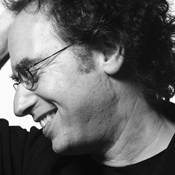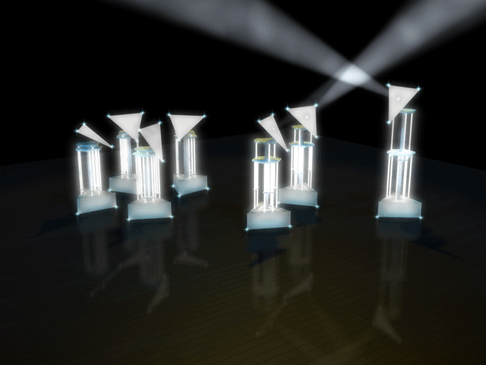But there are also moments of
fragile lyricism, pretty melodies that sing of the old values of love and
touch. The opera vacillates between the loud future of silicon and solenoid,
and the quietly humane past.
 Tod Machover
Tod Machover
Like certain other short operas, such as Rachmaninov’s Francesca da
Rimini, this is an opera in the past tense: the prologue shows us robots
in a post-organic world, trying to puzzle out the meaning of the nonsensical
word death. (There is something too cute about these robots, who look like the
sly agile desk lamps in the old Pixar animation, and who sound like the
apotheosis of R2D2.) The robots put on a skit—the opera itself—about the
transformation of the human into the post-human: a billionaire named Simon
Powers decides to abandon his dying body and place his consciousness, his
identity, into The System, a motile all-encompassing electrical structure that
is slowly replacing a dematerializing world. In this quest he is aided by
Nicholas, a young assistant with a prosthetic arm, and resisted, at least
partly, by his third wife Evvie and his daughter Miranda.
The name Miranda of course brings to mind Shakespeare’s The
Tempest, and makes us wonder whether Powers is just another name for
Prospero. In Dryden’s adaptation of The Tempest, Prospero never
forswears magic and retains his mastery over the elements; and Simon Powers is
a magician who keeps his power, although he may be a wizard lost in his own
labyrinth. Nicholas, who dances and prances around the stage, and climbs up the
grid of lights, is his affable Ariel.
Robert Pinsky’s text is more clumsy that one would expect from a
distinguished poet, full of lame puns and overextended parallels: he keeps
hitting you over the head with quotations from Yeats’s “Sailing to
Byzantium” (a poem about an old man who muses on his possible transfiguration
into a mechanical bird) and with plugs for poetry itself as something Important
to the Human Soul. But the text does have the virtue of a certain moral
ambiguity: it would have been easy to deplore the robots and to uphold the
grand old human world of tears and joy; but Pinsky refuses this easy simple
conflict, and makes The System a seductive place with at least partially real
delights, and makes the human world a place of evil as well as good. At one
point the delegates from the United Way, the United Nations, and the United
States (the last a superb bass, Tom McNichols, maybe the best singer in the
cast) visit the virtualized Simon to plead with him not to ruin the global
economy. But these are not figures of pathos, but officious fools, somewhat
like the Jews in Strauss’s Salome. And when the starving multitudes
thrust themselves onto the stage toward the end of the opera, they seem like a
bloodthirsty mob about to tear Miranda limb from limb. Only Miranda and Evvie
place the warm world of sorrow and devotion in a favorable light; and Evvie, at
least, herself decides to enter The System. In his interesting program note,
Pinsky implicitly compares his text to “a robot that performs the work of
meaning and emotion…the robots [in the opera] are in a sense returning the
favor of creation”; and intelligence and sensitivity of robots constitute an
important theme here.
 Rendering of Operabots interacting with each other
Rendering of Operabots interacting with each other
It is an odd opera in that there is little romantic love, and little
conflict beyond the cerebral pondering of robot vs. human cerebration. In this
way it resembles Das Rheingold, another opera with little romantic
love, and a good deal of thinking about the values of the wet old healthy
elemental world vs. the values of a futuristic society built by robots (or, as
Wagner called them, giants). In the scene where Simon gloats over his
successful assimilation into The System, Machover bases the music on a
triumphalist Naturthema not out of place in Wagner; and the sustained roar of
certain episodes near the end might call to mind another great moment of
sensory overload, the final bars of Das Rheingold.
The singing was satisfactory and evidently accurate, but unremarkable. James
Maddalena, the Simon, was not in excellent voice, but his forceful baritone
made for a potent stage presence—Alberich the billionaire, invisible in his
Tarnhelm but dominating the world.
Daniel Albright
image=http://www.operatoday.com/Machover_miranda_sara.gif
image_description=Sara Heaton as Miranda [Photo: http://opera.media.mit.edu/projects/deathandthepowers/gallery.php]
product=yes
product_title=Tod Machover: Death and the Powers
product_by=Simon Powers: James Maddalena; Evvy: Emily Albrink, Patricia Risley (Monaco Premiere); Miranda: Sara Heaton, JoÈlle Harvey (Monaco Premiere); Nicholas: Hal Cazalet. The United Way: Doug Dodson, Frank Kelley (Monaco Premiere); The United Nations: David Kravitz; The Administration: Tom McNichols, Daniel Cole (September 2009 Workshop). Boston Modern Orchestra Project. Conductor: Gil Rose. Principal Keyboard: John McDonald. Second Keyboard: Linda Osborn-Blaschke, Simone Ovsey (September 2009 Workshop). Director: Diane Paulus. Production Designer: Alex Mcdowell. Choreographer: Karole Armitage. MIT Media Lab.
product_id=Above: Sara Heaton as Miranda [Click here for photo gallery.]